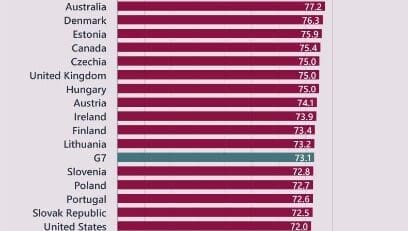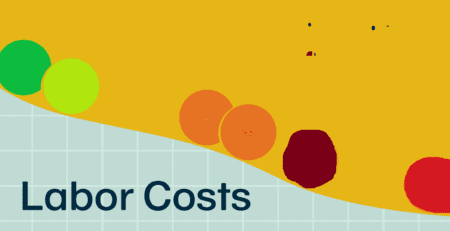Serbia tax system highlights
Serbia has a deep industrial tradition, a strategic transportation and technical infrastructure, a private sector accustomed to complement international business, rich natural resources, ideal location, a growing network of R&D institutes, and high quality secondary and tertiary education.
Serbia’s tax system is highly conducive to investment. Apart from featuring the lowest tax rates in Europe, investments can benefit from possible tax incentives which create excellent start up conditions.
The corporate profit tax is among the lowest in Europe, while the Value Added Tax is among the most competitive in Central and Eastern Europe.
Value Added Tax (VAT) is charged on supplies of goods and on services provided by a company, entrepreneur or individual in the course of pursuing its business activities within the territory of Serbia, as well as on the import of good s into Serbia, whereas export is exempt from taxation.
The regular VAT rate in Serbia is 20%, whereas the reduced rate of 10% is applied for supplies of certain products of public interest, including but not limited to: basic food products (e.g. sugar, cooking sunflower oil, bread, milk, flour, edible fats; fruits, vegetables, meat, fish, eggs); human and animal medicines, orthopedic and prosthetic appliances; text books and teaching aids, natural gas, etc.
VAT Law provides an extensive list of exemptions with the right to deduct input tax (so called zero rated supply) and ordinary exemptions without such right. Separately, VAT Law provides for exemptions applicable to the import of certain goods.
VAT Law provides for exceptional treatment of small taxpayers whose annual turnover does not exceed approximately EUR 69.000 or is not estimated to exceed the aforementioned amount. Specifically, those taxpayers are not subjected to VAT, unless they choose to be taxed in that manner.
In the event that the taxable income exceeds the amount of approximately EUR 431.000, the taxpayer is obligated to submit a monthly VAT return, otherwise VAT return shall be filed quarterly.
Corporate income tax is imposed on the profits of a company (joint-stock company, Limited Liability Company, general partnership, limited partnership, state owned enterprises, cooperative, etc.). Taxable income is usually comprised of business income and capital gains.
Resident companies are responsible for paying taxes on their worldwide income, whereas nonresident legal entities are responsible for paying taxes on income generated within the territory of Serbia. Taxable income is calculated in accordance with the tax balance sheet, which is specially prepared for that purposes. It should be noted that, for tax purposes, the branch/es and the head office of a foreign company are treated as separate entities. Generally, the corporate income tax is self-assessed by the taxpayer.
Both corporate income and capital gains are taxed at the rate of 15%. However, capital gains are subjected to a 20% rate for a nonresident taxpayer (e.g. branch office). Other related withholding taxes (e.g. interests, dividends, royalties) are taxed at rates between 15% and 25 %, nevertheless, different rates may be stipulated in Double Taxation Avoidance Treaties.
Serbia has concluded more than 50 Treaties, including those with Cyprus, Greece, Russia and Germany.
Tax incentives
Corporate Income Tax Law provides for tax holidays and investment tax incentives. The tax holiday that is envisaged as exemption from corporate income tax shall apply to other taxpayers (e.g. nonprofit organization) who shall not be considered as a joint-stock company, a limited liability company, a general partnership, a limited partnership, a state owned enterprise or a cooperative and for whom the realized surplus of receivables over the expenses did not exceed the amount of approximately EUR3.300 in the tax period for which the right to exemption was granted, in accordance with the conditions prescribed by Corporate Income Tax Law.
Investment tax incentives are prescribed mainly in favor of large investors. Any taxpayer that invests more than approximately EUR 8.261.000 in its fixed assets and who uses such assets for the exercise of its principal business and activities as those are defined in its founding documents or in some other documents of the taxpayer in which the line of business of said taxpayer and is identified and, further, who employed during the investment period at least 100 persons for an indefinite time period, shall be exempt from corporate profit tax in proportion to its investment for a period of ten years.
Companies are exempt from Corporate Profit Tax for a period of 10 years starting from the first year in which they report taxable profit if they:
- invest in fixed assets an amount exceeding approximately EUR 8.5 million, and
- hire at least 100 additional full-time employees during the investment period
The tax loss stated in the tax return can be carried forward and offset against future profits over a period of 5 years.
Residents (or persons with the center of its business activities in Serbia or persons with permanent residence who stay in Serbia for more than 183 days during the tax year) are responsible for their worldwide income (sum of all net receivables generated by taxpayer during the tax year), whereas nonresidents are responsible for income earned within the territory of Serbia.
The Salary Tax base in Serbia is deducted by approximately EUR 100 a month for all employees working full time. New employment entitles employers to a sizable relief of taxes and contributions paid on net salary from the moment of employment until June 30, 2016.
Salary taxes and insurance contributions are levied at the following rates:
(i) salary tax, 10%;
(ii) pension insurance contribution, 14%;
(iii) health insurance contribution, 5,15%;
(iv) unemployment insurance contribution, 0,75%.
These salary taxes and contributions payable by employees are withheld by the employer. Employer is also subjected to the contributions for health and unemployment insurance, at the rates outlined above, however, for pension insurance contribution it shall be taxed at the rate of 12%.
Thus, the overall and total percentage of all mandatory employment related taxes and contribution constitutes 47,8% of the employee’s taxable gross salary.
The annual income is taxed if exceeding the amount of threefold the average annual salary in Serbia. The tax rate is 10% for the annual income below the amount of 6 times average annual salary in Serbia, and 15% for the part of the annual income above the amount of 6 times average annual salary. The taxable income is further reduced by 40% of an average annual salary for the taxpayer and by 15% of an average annual salary for each dependent member of the family. The total amount of deductions cannot exceed 50% of the taxable income.
The rates for mandatory social security contributions are:
- 14% for pension and disability insurance,
- 5.15% for health insurance, and
- 0.75% for unemployment insurance.
The total sum of social security contributions and income taxes that are calculated on the net income, amounts to about 65% of net earnings.
The self-employed taxpayer is a natural person who earns income by way of performing business activities or by being subjected to value added tax in accordance with the law governing VAT. It should be noted that, pursuant to the latest amendments to the Law on Personal Income, income realized from agricultural and forestry activity shall also be considered as income from self-employed activity. Those natural persons are taxed at the rate of 10%, unless they are subjected to the lump-sum taxation regime. The limit for the lump-sum taxation is currently set at approximately EUR 52.000.
The taxpayer shall also be subjected to tax for the following kinds of income:
(i) royalties, at the rate of 20%;
(ii) rentals and capital income, at the rate of 15%
(iii) capital gains, at the rate of 15%;
(iv) other income, at the rate of 20%.
The withholding tax is not applied to dividend payments between Serbian entities. For non-residents of Serbia, a 20% withholding tax is calculated and paid on certain payments such as dividends, shares in profit, royalties, interest, capital gains, lease payments for real estate and other assets.
Real estate property tax
In general, the rights to own and use various kinds of real estate properties are subject to taxation. If the taxpayer is a natural person then the tax is levied on the market value of the real estate with progressive rates between 0,3% and 2%. However, if the taxpayer is a legal entity then the value of the real estate is determined in accordance with the book value of the real estate and is taxed at the following progressive rates:
(i) Up to 0,4% for taxpayers maintaining business book;
(ii) Up to 2% for taxpayers that do not keep business books. The actual rate will be defined by Municipality within the aforementioned limits.
Inheritance and gift tax
A person who inherits or receives property as a gift is defined as a taxpayer and thus is subjected to taxes at the progressive rate ranging from 1,5% to 2,5%. It should be noted that Property Tax Law in Serbia (PTL) envisages numerous exemptions and beneficiaries based predominantly on family law relations.
Transfer tax is payable by both natural persons and legal entities that sell or assign real estate property, intellectual property rights, certain motor vehicles, usage rights on construction land. Given that transfer tax and VAT are competitive taxes, PTL provides for an exemption from transfer tax applied on transfer of absolute rights if the assignment is considered as supply and thus subjected to the VAT regime. Taxpayers are taxed at the rate of 2,5%, whereas the taxable base is the agreed price so long as it is not below the market value.
Certain products in the Republic of Serbia (petroleum products, tobacco products, alcoholic beverages, coffee, bio-fuels and bio-liquids) are taxed in accordance with the excise regime.
Serbian governing law envisages two mechanisms for the prevention of tax avoidance:
(i) Transfer pricing rules;
(ii) Thin capitalization rules.
Financial transactions between affiliated companies (companies shall be deemed as affiliated if there is a possibility of control or significant influence on business decisions) must be done at arm’s length terms, which means that the taxpayer is subject to certain reporting requirements.
Thin capitalization usually occurs when the capital of the company is comprised of greater debt than equity (misbalance of the debt-equity ratio). Thus, pursuant to the Serbian rules, interests and related expenses paid on loans may not be withheld if they exceed by four times the equity of the company. For banks, insurance companies and other financial institutions the debt-equity ratio is set at 10:1.
Avoiding Double Taxation
If a taxpayer already paid tax on the profit generated abroad, he is entitled to a Corporate Profit Tax credit in Serbia to the already paid amount. The same right is enjoyed by a taxpayer who earns revenue and pays Personal Income Tax in another country, provided there is a Double Taxation Treaty with that country.
Free zones
Value Added Tax Exemptions in Free Zones Income generated through commercial activities in the Free Zones in Serbia is exempted from Value Added Tax.
There are twelve Free Zones, currently operating in the country:
Pirot, Subotica, Zrenjanin, FAS Kragujevac, Sabac, Novi Sad, Uzice, Smederevo, Svilajnac, Krusevac, Apatin, Vranje, Priboj and Belgrade.
Foreign companies can establish a privately-owned Free Zone based on the project approved by the government.
Foreign investors in Serbia can enjoy the benefit of customs free import of raw material and semi-finished goods for export oriented production. This benefit can either be achieved by operating in one of the free zones in Serbia or by a permit from custom office for outward processing production. In both cases finished products must be 100% designated for export.
Foreign investors are exempt from paying customs duty on imported equipment and machinery which represents the share of a foreign investor in a capital of a company in Serbia.
A wide array of incentives is also available at the local level, varying in scope and size from one city to another. The major ones comprise the following:
- City construction land lease fee exemptions or deductions, including the option of paying in installments, with the prior consent of the Serbian Government;
- City construction land development fee relief such as fee exemptions or discounts for one-off payments;
- Other local fees exemptions or deductions (e.g. the fee for displaying the company’s name).




Leave a Reply
You must be logged in to post a comment.